|
> If you wish to receive a paper copy, contact: sylvie.letassey@oecd.org
Atlas on Regional Integration
Biotechnology
Climate Change
|
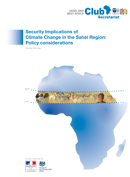
|
Security implications of climate change in the Sahel region: policy considerations
Philipp Heinrigs, February 2011
The project ‘Security implications of climate change in the Sahel region’ aimed to increase understanding of the linkages and impacts of climate change and security and on how climate change could contribute to insecurity in the future. This paper summarises and brings together the conclusions of the analyses carried out and identifies key issues for policy makers, specific interest for future work and gaps and uncertainties in existing research.
> Executive summary | > full study
|
|
|
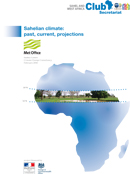
|
Sahelian climate: past, current, projections
UK Met Office Hadley Centre, February 2010
This study on Sahel climate, climate variability and climate change summarises what we currently know about present and future climate over the Sahel region.
|
|
|
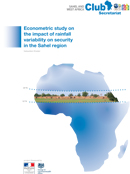
|
Econometric study on the impact of rainfall variability on security in the Sahel region
Sebastian Hissler, November 2009
This paper proposes a two-channel model to identify and analyse the impact of climate variability on security events. Specification of this model is based on a review of quantitative literature, and a specific focus has been made for the results obtained from this model to contribute to a mapping of vulnerability.
|
|
|
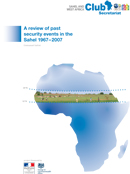
|
A review of past security events in the Sahel 1967 – 2007
Emmanuel Salliot, August 2010
> Presentation sheets
|
|
|
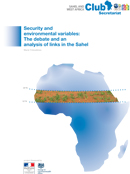
|
Security and environmental variables: The debate and an analysis of links in the Sahel
Marie Trémolières, August 2010
This analysis of past security events in the Sahel highlights the complexity of variables intervening in the relationship between climate change and security and the impossibility of defining generalisable qualifications. It stresses the dominant influence of political and economic variables on security and particularly on conflict and promotes orients policy actions towards promoting the well being of populations, focusing on food security and livelihood.
|
 |
Climate and climate change, Regional Atlas on West Africa, chapter 14, SWAC/OECD, West African Studies, January 2008.
Like all other world regions, Africa and West Africa must take up the challenge of climate change which is essentially that of vulnerability and uncertainty. Analyses of this region have remained inadequate and the conclusions arrived at by climate projections and their consequences are too uncertain for an effective anticipation of the risks and opportunities linked to climate change. Greater awareness and participation by local actors will also be necessary to formulate and implement these adaptation strategies.
|
|
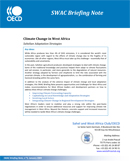 |
Le changement climatique en Afrique de l’Ouest, SWAC Briefing note, January 2009
While Africa produces less than 4% of worldwide greenhouse gas (GHG) emissions, it is considered the world’s most vulnerable region with regard to the effects of climate change due to the fragility of its economies. Like all other regions, West Africa must take-up this challenge – essentially that of vulnerability and uncertainty. In addition to the analysis of the climate change impacts and a presentation of some adaptation strategies developed by agricultural producers in the Sahel, this SWAC Briefing Note presents opportunities and makes recommendations for West African leaders and development partners on how to address West Africa’s climate change challenges.
|
Cocoa
|

|
Emerging good practice in combating the worst forms of child labour in West African cocoa growing communities
November 2011
Building on collaborative work conducted by the SWAC Secretariat in collaboration with the International Cocoa Initiative, this work gathers together the experiences and ideas from representatives of governments, organisations and agencies active at different stages along the cocoa supply chain as well as from men, women and children living in cocoa growing communities. It outlines seven key messages and identifies some emerging good practices from existing interventions in the hope of contributing to their proliferation. It reflects on the roles and responsibilities of those concerned to encourage greater clarity, co-ordination and collaboration in the coming years.
|
|
|
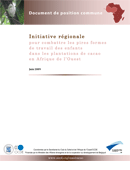
|
joint position paper
This document reflects the common vision of the Task Force members. Signed by 14 stakeholders and regional organisations, it underlines the need to develop a complementary regional approach to combat the worst forms of child labour on West African cocoa farms. It highlights the need for a complementary regional approach, regional institutional leadership, support to intensified remediation efforts, and co-ordination and inclusiveness.
|
|
|
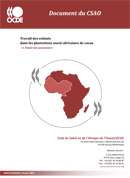
|
Regional desk study (French)
This Desk study analyses the structural aspects of child labour within its context (demographic trends, regional population density, evolution of child labour, West African cocoa prospects, etc.), national policies, international norms (ILO, conventions, etc.) and their implementation as well as current practices of involved actors.
> download the full paper (French) | > Conclusions
|
|
|

|
> download this chapter of the Regional Atlas on West Africa
Chapter of the Regional Atlas on West Africa
September 2007
Since 1960, world cocoa production has increased threefold, from 1.2 to 3.6 million tonnes. This growth was punctuated by several jolts caused by structural adjustment policies, crop infestations, diseases and market speculation, all of which have affected production. Three countries in the inter-tropical zone growing cocoa beans, dominate world production: Côte d’Ivoire (39%), Ghana (21%) and Indonesia (13%).The important West African production basin extends from Guinea to Cameroon where, apart from Benin, all the countries grow cocoa trees.
> download this chapter of the Regional Atlas on West Africa (3 Mb)
|
Cotton
Cross-Border Co-operation
|

|
Practical guide on cross-border co-operation
Lessons from Mali-Burkina Faso and regional perspectives
February 2011
This CD-ROM provides cross-border co-operation actors with analyses of possible approaches for facilitating financial and legal arrangements of their activities. A selection of maps of West African borders is also included.
|
|
Democracy, Peace & Security
|
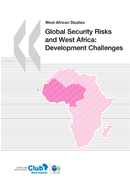
|
Global Security Risks and West Africa: Development Challenges
OECD West African Studies, January 2012
This SWAC publication explores current global security issues, their development in West Africa and their potential impact on regional stability. It takes a close look at issues such as terrorism and trafficking, climate change, and the links between “security and development”. Some of these issues are still the object of heated debate. This book draws attention to the risk of oversimplified analyses and biased perceptions of security risks. It also highlights the need for co-ordinated policies and dialogue between West Africa, North Africa and OECD countries.
|
|
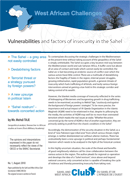 |
Vulnerabilities and factors of insecurity in the Sahel
August 2010
The blanket media coverage of insecurity reflected in the series of kidnapping of Westerners and burgeoning growth in drug trafficking needs to be examined, according to Mehdi Taje, Geopolitical analyst, Researcher in African studies at Irsem, “cautiously and against the background of foreign powers’ strategies”. The SWAC Secretariat presents Mr. Taje's analysis, highlighting that the activities of the Al-Qaeda Organization in the Islamic Maghreb (AQIM) may well be no more than overstated terrorism which masks the real issues at stake. > download Taje's analysis
|
Fisheries & Aquaculture
-
" Fishing for Coherence", Policy Coherence in the Fisheries Sector in Seven West African Countries, The Development Dimension Series
-
-
-
Food Security
|
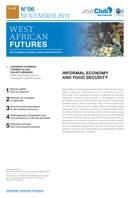
|
West African Futures : Settlement, Regional Market, Food Security
- West African urbanisation trends, no. 1, June 2011
- Harmonisation of West African settlement data, no. 2, July 2011
- Economic concentration and settlement, no. 3, Aug 2011
- Agricultural and non-agricultural population, no. 4, Sep 2011
- Regional trade and food security, no. 5, Oct 2011
- Informal economy and food security, no. 6, Nov 2011
|
|
|
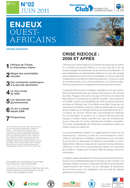
|
The 2008 rice crisis – shock and new challenges
West African Challenges, no. 2, June 2011
West Africa currently imports 5.2 million tonnes of rice, compared with 1.7 million tonnes in the early 1990s, and is only able to cover 60% of its needs despite possessing considerable rice-growing potential. The region will nevertheless for the foreseeable future remain dependent on an international market in which prices are structurally rising and which is increasingly volatile. This paper analyses the crisis of 2008, new trends and policy responses to address new challenges in the rice sector. It is based on a study carried out between May and December 2010 by CILSS, CIRAD, FAO, FEWS NET and the WFP.
|
|
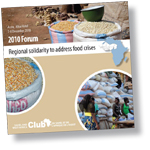 |
Regional solidarity to address food crises
Accra, 7-8 December 2010
Building on lessons learnt in the establishment of regional food stocks in Asia, Latin America, and the Carribean and Southern Africa, SWAC’s 2010 Forum brings together key stakeholders to facilitate the setting-up of a regional food stock in West Africa. This Forum guide includes the agenda, presentations of speakers and background documents of the Forum.
|
Governance & Conflict
-
-
-
-
-
“DDR, Post-conflict and Development in West Africa”, Meeting of the Regional Working Group, volume 1 (summary report) | volume 2 (working documents), Praia, Cape Verde, September 2007
-
"Regional Working Group on DDR Programmes and Post-conflict Management in West Africa", volume 1 (summary record) | volume 2 (working documents, December 200
-
“The Dynamics of Exit from Crisis in West Africa: the Role of Political Dialogue and Security Sector Reform”, summary report, Bissau, Guinea-Bissau, December 200
-
"Initiative on Dynamics on Exit from Crisis, summary report (French), launching workshop, Ziguinchor (Senegal), October 2005
Land issues
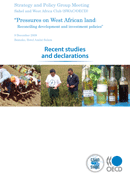 |
December 2009
This paper is a compilation of studies conducted by the International Land Coalition (ILC), the International Institute for Environment and Development (IIED), the Food and Agriculture Organization of the United Nations (FAO) and the SWAC Secretariat on land issues and food security in West Africa. It also presents recent declarations of political actors at the regional and international level. A glossary provides clear definitions of the most important technical terms.
|
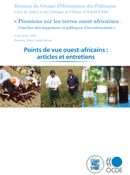 |
West African viewpoints on land issues, interviews and articles (French)
December 2009
This document has been prepared by a network of West African journalists. Building on articles and interviews conducted in 12 countries of the region, it analyses land issues and trends in West Africa, opportunities and risks for domestic and international investors as well as their impact on local populations.
|
Livestock & Transhumant Pastoralism
Migration
-
-
SWAC Presentation ( French), by Mr. Laurent Bossard, Experts' Meeting on Migration and Development, Dakar (Senegal), 9-11 July 2008
-
SWAC Mission Report on the " ECOWAS Common Approach on Migration", by Mr. Laurent Bossard, Experts' Meeting, Dakar (Senegal), 11-12 April 2007
-
-
Migration, Chapter of the Atlas on Regional Integration, August 2006
-
Perspectives
Rural Transformation
|